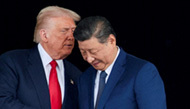An Energy Oracle Predicts Oil at $200 a Barrel
Arjun N. Murti remembers the pain of the oil shocks of the 1970s. But he is bracing for something far worse now: He foresees a “super spike” - a price surge that will soon drive crude oil to $200 a barrel.
Mr. Murti is not bothered much by the prospect of even higher oil prices, figuring it might finally prompt people to become more energy efficient.
An analyst at Goldman Sachs, Mr. Murti has become the talk of the oil market by issuing one sensational forecast after another. A few years ago, rivals scoffed when he predicted oil would breach $100 a barrel. Few are laughing now.
Mr. Murti, 39, argues that the world’s seemingly unquenchable thirst for oil means prices will keep rising from here and stay above $100 into 2011. Others disagree, arguing that prices could tumble if speculators in the market rush for the exits. (Reinforcing this view, on June 22, the Democrats’ presumptive presidential nominee, Senator Barack Obama, proposed tightening the regulation of oil speculators in an effort to ease record high gasoline prices.)
But the grim calculus of Murti’s prediction, issued in March, is enough to give anyone pause: in an America of $200 oil, gasoline could cost more than $6 a gallon.
That would be fine with Mr. Murti . “I’m actually fairly anti-oil,” says Mr. Murti, who grew up in New Jersey. “One of the biggest challenges our country faces is our addiction to oil.”
Mr. Murti is hardly alone in predicting higher oil prices. Boone Pickens, the oilman turned corporate raider, said that crude would hit $150 this year. But many analysts are no longer so sure where oil is going, at least in the short term. Some say prices will fall as low as $70 a barrel by year-end, according to Thomson Financial.
Experts disagree over the supply of oil, the demand for it and whether recent speculation in the commodities markets has artificially raised prices. As an energy analyst at Citigroup, Tim Evans, reportedly put it, trading commodities these days is like “sticking your hand in a blender.”
Whatever the case, oil analysts like Mr. Murti have suddenly taken on the aura that enveloped technology analysts in the 1990s.
“It’s become a very fashionable area to write about, said Kevin Norrish, a commodity analyst at Barclays Capital, which began predicting high oil prices around the same time as Goldman. “And to try to get attention from people, people are coming out with all sorts of numbers.
This was not always the case. In the 1990s, oil research was a sleepy area at banks. Many analysts assumed oil prices would hover near $15 to $20 a barrel forever. If prices rose much above those levels, they figured, consumers would start conserving, suppliers would raise production, or both, causing prices to decline.
But around the turn of the century, oil company after oil company started missing predicted production.
Since starting his career at Petrie Parkman & Company, a Denver-based investment firm acquired by Merrill Lynch in 2006, Mr. Murti had been conservative in his calls on oil. But by 2004, he concluded the world was headed for a long supply shock that would push prices through the roof. That summer, as oil traded for about $40 a barrel, Mr. Murti coined what has become his signature phrase: super spike.
The following March, he drew attention by predicting prices would soar to $105, sending shock waves through the market. Angry investors questioned whether Goldman’s own oil traders benefited from the prediction. At Goldman’s annual meeting, Henry M. Paulson Jr., then the bank’s chief executive and now the United States Treasury secretary, found himself defending Mr. Murti.
“Our traders were as surprised as everyone else was,” Mr. Paulson reportedly said. “Our research department is totally independent. Our trading departments have no say about this.”
Mr. Murti was proved right again. Oil crossed $100 in February. “Even if you disagree with their views, the problem is that Goldman does carry so much credibility,” said Nauman Barakat, senior vice president for global energy futures at Macquarie Futures USA. “There are a lot of traders who are going to buy based on their reports.”
Mr. Murti, for his part, discounts suggestions that his reports affect market prices. “Whenever an analyst upgrades a stock or downgrades a stock, sometimes you get a reaction that day, but beyond a day, fundamentals win out,” he said.
Mr. Murti falls into the camp of oil analysts who believe that supply is likely to remain tight because of geopolitical factors.
These analysts predict higher prices because production is declining in non-OPEC countries like Britain, Norway and Mexico. The analysts who predict lower prices say there are supplies of oil that the bullish analysts are missing. “This year will be a year in which supply will be put into the market by stealth by OPEC and by countries we call black-hole countries,” said Edward L. Morse, chief energy economist at Lehman Brothers. China is one example, he said.
But while oil and gas prices have been rising for a while , efforts to conserve have not dragged down prices.
Mr. Murti, who spends most of his time talking to money managers and analysts, says he applauds investors for driving up oil prices, since that will spur investment in alternative sources of energy.
“The greatest thing in the world would be if in 15 years we no longer needed oil analysts,” he says.
스마터리빙
more [ 건강]
[ 건강]이제 혈관 건강도 챙기자!
[현대해운]우리 눈에 보이지 않기 때문에 혈관 건강을 챙기는 것은 결코 쉽지 않은데요. 여러분은 혈관 건강을 유지하기 위해 어떤 노력을 하시나요?
 [ 건강]
[ 건강]내 몸이 건강해지는 과일궁합
 [ 라이프]
[ 라이프]벌레야 물럿거라! 천연 해충제 만들기
 [ 건강]
[ 건강]혈압 낮추는데 좋은 식품
[현대해운]혈관 건강은 주로 노화가 진행되면서 지켜야 할 문제라고 인식되어 왔습니다. 최근 생활 패턴과 식생활의 변화로 혈관의 노화 진행이 빨라지고
사람·사람들
more많이 본 기사
- ‘AI 대부’ 제프리 힌턴 “오픈AI·메타, AI 안전보다 이익 중시”
- 진보 간판 샌더스 “부유한 자들이 AI 밀어붙여” 쓴소리
- 정용진 신세계그룹 회장 “비상할 준비… 1
- 특검 “김건희, 장막 뒤에서 불법 국정개입…尹과 정치공동체”
- 트럼프, 4주년 앞둔 우크라전 終戰불씨 살리나…진전·한계 병존
- 장거리 여행 중에도 입시 준비… ‘오디오북·교육앱·팟캐스트’로
- 뉴욕·북유럽에 눈폭풍…잇단 항공편 결항에 교통대란
- 美서 스마트폰 ‘부모통제’ 기능으로 납치 청소년 구조
- 佛배우 브리지트 바르도 별세…생전 韓보신탕 문화 비판
- 李대통령, 12·29 참사에 “대통령으로서 사죄…유가족 종합지원”
- 이혜훈 “韓경제 ‘회색코뿔소’ 상황…미래안목 기획·예산 연동”
- ‘정계은퇴선언’ 펠로시 “중간선거서 민주당이 하원 다수당 될것”
- 中, 9개월만에 ‘대만포위’ 훈련… “외곽차단 등 실전능력 검증”
- 초유의 ‘3특검’ 활동 종료…헌정사 첫 전직 대통령부부 동반기소
- “13초만에 수백만 달러 매출” 방탄소년단 뷔 3분 라이브 방송이 만든 크리스마스의 기적
- 정석원, ♥백지영과 수입 격차 언급하더니.. “전역 반지까지 팔아”
- ‘친형 구속’ 박수홍, 그 다음은 ‘198억 손해배상’
- 충격 진단 “네이마르 이미 끝났다, 몸 심각하게 손상”... ‘식단 문제·훈련 부족’ 지적 “월드컵? 너무 늦었다”
- 李대통령, 오늘 청와대 첫 출근… ‘용산 시대’와 결별
- ‘마이큐♥’ 김나영, 재혼 두달 만에 큰 결심.. “한부모 가정에 1억원 기부”
- 웨스트브룩, 존슨 앞질러 NBA 통산 어시스트 7위… 팀은 탈꼴찌
- 고금리·고가격·관세 ‘브레이크’… 신차 시장 썰렁
- ‘180일 질주’ 김건희특검 수사결과 발표…20명 구속·66명 기소
- 北, 장거리순항미사일 발사…김정은 “핵무력 무한대 발전 총력”
- 트럼프 “돈바스 일부 의견접근”…젤렌스키 “안전보장 거의 합의”
- 뉴저지서 헬기 2대 공중 충돌… “최소 1명 사망”
- 삼보일배·108배…집회도 대통령 따라 다시 청와대 앞으로
- ‘정신건강 위험’ 비판받은 오픈AI, AI 안전 책임자 다시 모집
- 시니어들 상황별 리버스모기지의 선택
- “케데헌이 없애준 장벽… “ WSJ ‘미국인 사로잡은 K팝’ 조명
- 韓, 이번주 안보리 이사국 2년 임기종료…외교지평 확대 평가
- 트럼프 “종전협상 마지막 단계”…젤렌스키 “신속한 평화 오길”
- 러시아 “대만해협 긴장 고조시 중국 지지…대만은 中 일부”
- 뉴욕에 3년만에 최대 폭설…이틀째 항공·도로 대란
- 국힘, 이혜훈 발탁에 최고위 열어 ‘제명’… “배신” 비난 쏟아져
- “내년 미중관계 4대 화약고는 대만·콩·수출통제·군사굴기”
- 중도보수 중량급 인사 중용…李대통령 ‘실용주의 용인술’ 재부각
- “지금은 하늘에... 아빠가 뛰던 곳이란다” 故 조타 아들 둘, 반 다이크 ‘손 꼭 붙잡고’ 안필드 찾았다
- 트럼프, 태국-캄보디아 휴전에 “미국이 기여…유엔, 도움안돼”
- “개인 선정은 SON이 유일?” 손흥민, 축구계 8대 기적 선정이 더 대단한 이유 “퀴라소 월드컵 진출보다 멋져”
- 올해 美 기업 파산신청 증가… “관세·고물가·고금리 원인”
- 트럼프, 젤렌스키와 회동 앞서 “푸틴과 생산적인 통화했다”
- 180일간 김건희만 판 특검 오늘 수사 종료…’V0’ 단죄 성과
- 쿠팡 김범석, 30~31일(한국시간) 연석청문회 또 불출석 의사… “일정 있어”
- ‘AI 조작 번복’ 폭로자 vs ‘유재석 패싱’ 이이경..하차 잔혹사로 번진 사생활 논란 [2025 연말결산]
- “올해 최고 주목받은 테크 거물은 머스크 아닌 래리 엘리슨”
- 뉴욕시 폭설에 항공기 수천편 취소·지연 사태
- ‘통일교 자금관리’ 한학자 前비서실장 재소환…피의자 전환
- 이이경·조세호 다 떠나고..유재석 곁엔 결국 ‘무도’ 인연이었다
- 마지막 토요일도 도심 집회… “내란 … 6
1/5지식톡

-
 미 육군 사관학교 West Poin…
0
미 육군 사관학교 West Poin…
0https://youtu.be/SxD8cEhNV6Q연락처:wpkapca@gmail.comJohn Choi: 714-716-6414West Point 합격증을 받으셨나요?미 육군사관학교 West Point 학부모 모…
-
 ☝️해외에서도 가능한 한국어 선생님…
0
☝️해외에서도 가능한 한국어 선생님…
0이 영상 하나면 충분합니다!♥️상담신청문의♥️☝️ 문의 폭주로 '선착순 상담'만 진행합니다.☎️ : 02-6213-9094✨카카오톡ID : @GOODEDU77 (@골뱅이 꼭 붙여주셔야합니다…
-
 테슬라 자동차 시트커버 장착
0
테슬라 자동차 시트커버 장착
0테슬라 시트커버, 사놓고 아직 못 씌우셨죠?장착이 생각보다 쉽지 않습니다.20년 경력 전문가에게 맡기세요 — 깔끔하고 딱 맞게 장착해드립니다!장착비용:앞좌석: $40뒷좌석: $60앞·뒷좌석 …
-
 식당용 부탄가스
0
식당용 부탄가스
0식당용 부탄가스 홀세일 합니다 로스앤젤레스 다운타운 픽업 가능 안녕 하세요?강아지 & 고양이 모든 애완동물 / 반려동물 식품 & 모든 애완동물/반려동물 관련 제품들 전문적으로 홀세일/취급하는 회사 입니다 100% …
-
 ACSL 국제 컴퓨터 과학 대회, …
0
ACSL 국제 컴퓨터 과학 대회, …
0웹사이트 : www.eduspot.co.kr 카카오톡 상담하기 : https://pf.kakao.com/_BEQWxb블로그 : https://blog.naver.com/eduspotmain안녕하세요, 에듀스팟입니다…
케이타운 1번가
오늘의 1면
오피니언

새해 더 중요해지는 노동법 준수

연말연시, 안전하고 차분하게
 캐슬린 파커 워싱턴포스트 칼럼니스트
캐슬린 파커 워싱턴포스트 칼럼니스트 [캐슬린 파커 칼럼] 지미 라이의 마지막 희망
 유경재 나성북부교회 담임목사
유경재 나성북부교회 담임목사 [한국춘추] 미국의 힘
 전병두 서북미수필가협회 회원
전병두 서북미수필가협회 회원 [금요단상] 비자 발급
 박일근 / 한국일보 수석논설위원
박일근 / 한국일보 수석논설위원 [지평선] 스님의 주례사
 신상철 / 고려대 고고미술사학과 교수
신상철 / 고려대 고고미술사학과 교수 [미술 다시보기] 신의 모습을 닮고자 한 예술가
 스티브 강 전 한인민주당협회 회장
스티브 강 전 한인민주당협회 회장 [스티브 강 ‘인사이드 미국’] 2026 중간선거: 트럼프 지지율 하락이 말해주는 것
 김홍일 케이유니콘인베스트먼트 대표
김홍일 케이유니콘인베스트먼트 대표 [기고] 안정의 기준은 어떻게 제도가 되었나
1/3지사별 뉴스

물류거점창고에 불체자 8만명 수용 추진
도널드 트럼프 행정부가 이민자 구금·추방을 효율화하기 위해 전국 물류거점 창고에 8만명 규모의 수용시설 확보를 추진한다고 24일 워싱턴 포스트…
‘학자금 상환’ 안하면 임금압류

“온 세상에 희망·평화의 빛 스며들길”
가자지구와 우크라이나에서의 전쟁, 고립과 불평등으로 세상이 어지러운 가운데 워싱턴 지역 각급 한인교회와 성당들이 성탄절을 맞아 일제히 예배와 …
“연말은 스트레스·새해 결심은 없다”

“올해 최고 주목받은 테크 거물은 머스크 아닌 래리 엘리슨”
올해 미국에서 가장 주목받은 기술업계 거물은 일론 머스크 테슬라 최고경영자(CEO)가 아닌 래리 엘리슨 오라클 창업자·회장이라고 블룸버그 통신…
[새해부터 이렇게 달라진다] 최저임금 또 오르고… 유급 병가는 더 확대

오늘 하루 이 창 열지 않음 닫기 





















































.png)


댓글 안에 당신의 성숙함도 담아 주세요.
'오늘의 한마디'는 기사에 대하여 자신의 생각을 말하고 남의 생각을 들으며 서로 다양한 의견을 나누는 공간입니다. 그러나 간혹 불건전한 내용을 올리시는 분들이 계셔서 건전한 인터넷문화 정착을 위해 아래와 같은 운영원칙을 적용합니다.
자체 모니터링을 통해 아래에 해당하는 내용이 포함된 댓글이 발견되면 예고없이 삭제 조치를 하겠습니다.
불건전한 댓글을 올리거나, 이름에 비속어 및 상대방의 불쾌감을 주는 단어를 사용, 유명인 또는 특정 일반인을 사칭하는 경우 이용에 대한 차단 제재를 받을 수 있습니다. 차단될 경우, 일주일간 댓글을 달수 없게 됩니다.
명예훼손, 개인정보 유출, 욕설 등 법률에 위반되는 댓글은 관계 법령에 의거 민형사상 처벌을 받을 수 있으니 이용에 주의를 부탁드립니다.
Close
x